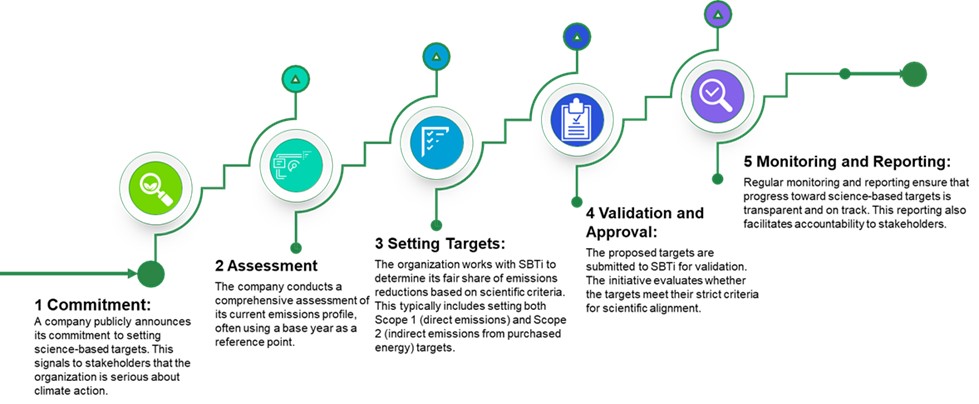A new path
In an era marked by unprecedented environmental challenges, the need for a concerted effort to combat climate change has never been more critical. The Science-Based Targets Initiative (SBTi) emerges as a beacon of hope in the sustainability landscape. This groundbreaking initiative has taken the global business community by storm, offering a data-driven and science-backed approach to curbing greenhouse gas emissions.
Where did it all start?
The Science-Based Targets Initiative was launched in 2015 as a collaboration between four major organizations: CDP (formerly the Carbon Disclosure Project), the United Nations Global Compact, the World Resources Institute (WRI), and the World Wide Fund for Nature (WWF). Its primary aim is to guide companies in setting ambitious and effective climate targets aligned with the best available climate science.
The Initiative operates on the foundational premise that limiting global warming to well below 2 degrees Celsius above pre-industrial levels, as agreed upon in the Paris Agreement, requires substantial reductions in greenhouse gas emissions across all sectors. To achieve this, SBTi provides a framework for companies to establish their climate targets in line with the latest scientific knowledge based in the following axes:
- Define and promote best practices for carbon emissions reduction, aligned with the latest climate science research.
- Provide methods and guidelines for companies to set their emission reduction targets based on the latest climate science research.
- Make available a team of expert scientists to advise companies and validate their emission reduction targets.
The Science-Based Target Setting Process

SBTs are intended to act as a competitive advantage for companies.
In this sense, SBTs act as a lever for change to promote the decarbonization of companies and financial institutions. The idea is that these “science-based targets” can lead to a competitive advantage for the companies that adopt them.
What are the advantages of implementing SBTs in companies?
The first advantage or benefit is for the Planet. Reducing CO2 emissions will reduce the risk of more extreme events, climate migrations, infrastructure losses, fires and all kinds of negative consequences linked to climate change.
Why Science-Based Targets Matter
To begin with, all companies, regardless of their industry or size, are eligible to participate in the SBT initiative. However, it is especially sought that the industries with the highest GHG emissions are the ones to participate in the project.
Preserving a Liveable Planet: The Science-Based Targets Initiative plays a crucial role in preserving the habitability of our planet. By encouraging businesses to adopt science-based targets, it helps reduce the likelihood of catastrophic climate change impacts, such as extreme weather events, sea-level rise, and biodiversity loss.
Mitigating Financial Risks: Companies that fail to address climate change risk facing financial consequences. SBTi helps businesses identify and mitigate climate-related financial risks by aligning their operations with the global effort to limit warming. This can enhance long-term resilience and sustainability.
Enhancing Reputation and Competitive Advantage: As consumers become more eco-conscious, companies that demonstrate a commitment to science-based sustainability are increasingly favored. Adopting science-based targets can bolster a company’s reputation, attract investors, and create a competitive edge.
Regulatory Compliance: Governments worldwide are implementing stricter environmental regulations. Aligning with science-based targets can put companies ahead of the curve, ensuring compliance with future regulations and avoiding potential penalties.
Which organizations are part of it?
Numerous companies across various industries have already embraced the Science-Based Targets Initiative with remarkable results:
IKEA: The furniture giant committed to reducing its greenhouse gas emissions by 80% by 2030, in line with 1.5°C global warming, and reached its 100% renewable energy target for its global operations.
Sony: Sony pledged to achieve zero net greenhouse gas emissions across its entire business by 2050, demonstrating its commitment to sustainability in the consumer electronics sector.
Nestlé: The food and beverage conglomerate committed to net-zero emissions by 2050 and is investing in renewable energy and more sustainable agriculture practices.
The full list of companies taking action can be consulted through the SBTi’s target dashboard. Updated every Thursday, the dashboard includes high-level information about each organization’s targets or commitments.
Science-Based Targets Initiative empower companies
The Science-Based Targets Initiative is transforming the way businesses approach sustainability and climate action. By grounding corporate goals in rigorous scientific analysis, SBTi is empowering companies to take meaningful steps toward a more sustainable and resilient future. As the world races against the clock to combat climate change, the SBTi offers a roadmap for companies to not only reduce their environmental footprint but also thrive in an increasingly sustainable global economy. It’s a testament to the power of science and collaboration in addressing one of the greatest challenges of our time.
An article by Nicolás Mendoza



